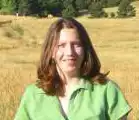
Andrea Bair
Science/Geosciences, Science & Mathematics
Delta College
I currently teach and head a small geology program at a community college in mid-eastern Michigan.
My background includes a Geology BS (Michigan State), a Geology PhD specializing in Vertebrate Paleontology (Nebraska), and had a post-doc Science Teaching Fellowship as part of the Science Education Initiative at the University of Colorado-Boulder (http://www.colorado.edu/sei/), where I supported research-based transformation of undergraduate geology courses.
I maintain a small research program at the interface of GER and cognitive science, particularly how novices interpret expert visualizations, and utilizing cognitive psychology findings to improve our use of visualizations in teaching. I'm also interested in effective use of technology in teaching and learning (especially the use of clickers and computer simulations), physical models and analogies in teaching and learning science, conceptual learning in the geosciences, scientific explanation and argumentation, and the geology and paleontology of the North American Great Plains.
Website Content Contributions
Activity (1)
Teaching about geologic structures with craft foam models and hands-on guided exploration activities part of Earth Educators Rendezvous:Previous Rendezvous:Rendezvous 2019:Program:Teaching Demonstrations:Friday
Classroom instruction on geologic structures often involves models demonstrated by the instructor, and/or student construction of paper or clay models. While these models can be useful for conceptual learning, ...
Conference Presentations (2)
Connecting magma formation, origin of crust, and the meaning behind igneous rocks using research-based diagrams, analogies, and games in physical geology part of Earth Educators Rendezvous:Previous Rendezvous:Rendezvous 2016:Program:Teaching Demonstrations:Thursday B
This activity aims to: dispel common misconceptions about the origin of magma (i.e., from a liquid layer of Earth), promote understanding of the processes of magma generation, help students see igneous rocks as ...
Teaching and learning evolutionary trees: how cognitive science predicts "better" and "worse" diagram styles part of Rendezvous 2015:Program:Abstracts
A cladogram is a branching diagram commonly used to depict hypotheses of evolutionary relationships, and is a central representation of evolution in the fossil record. Biological education research has identified ...
Other Contributions (6)
Online Introductory Geoscience Labs: Challenges and strategies to support engagement and learning part of Earth Educators Rendezvous:Previous Rendezvous:Rendezvous 2024:Program:Round Table Discussions
More introductory undergraduate online lab courses in the geosciences are being offered now than ever before. Fully online lab courses can allow more students, and students who are not able to complete face-to-face ...
Communities

North Central Section, Geo2YC: The Two-Year College Division, Geoscience Education Research Division
July 2024 Earth Educators Rendezvous 2023
July 2023 Earth Educators Rendezvous 2022
July 2022 Earth Educators Rendezvous 2021
July 2021 Earth Educators Rendezvous 2020
July 2020 Earth Educators Rendezvous 2019
July 2019 Earth Educators Rendezvous 2016
July 2016 Earth Educators Rendezvous 2015
July 2015 Caltech Seismo Lab Tour 2
EER 2024 fMRI Lab Tour - Tuesday
GETSI Community
Integrate/GETSI 2023 Survey
NAGT All
Project EDDIE FMN Spring 2022 Participants
SAGE 2YC Cohort 2 Change Agents
Teach the Earth
TIDeS Interest
Environmental Justice and Freshwater Resources Interest Group
Eyes on the Hydrosphere: Tracking Water Resources Interest Group
GETSI Interest Group
Humans' Dependence on Earth's Mineral Resources Interest Group
Ice Mass and Sea Level Change Change interest Group
Interactions between Water, Earth’s Surface, and Human Activity Interest Group
Measuring the Earth with GPS Interest Group
Monitoring Volcanoes and Communicating Risks Interest Group
NAGT Webinar Series Interest
Earth Educators' Rendezvous Interest Group
Education Icon
ICON Education Interest List
Teaching Geoscience Online
Workshop Leader
EER 2022 Mini-Workshop Using Design our Climate Simulation Participants
Workshop Participant (56 workshops)
April 2023 GETSI Virtual Short Course 6 Volcanoes and Risks
February 2021 Teaching Online Introductory Geoscience Labs
July 2020







